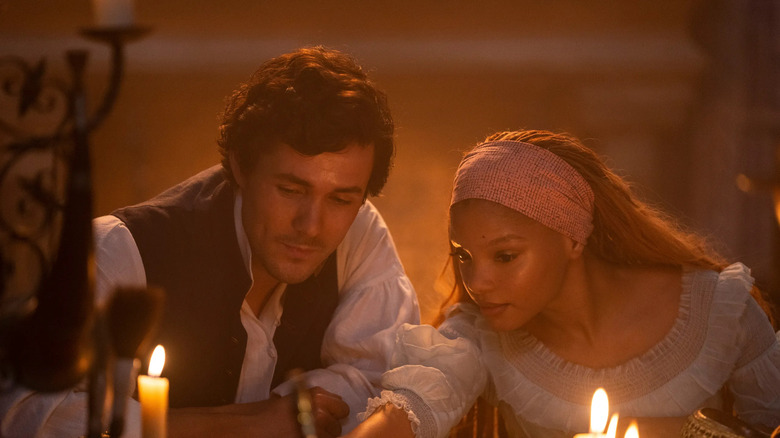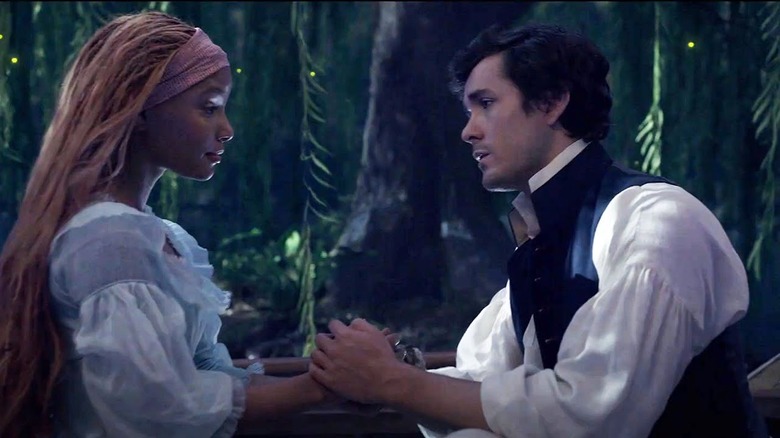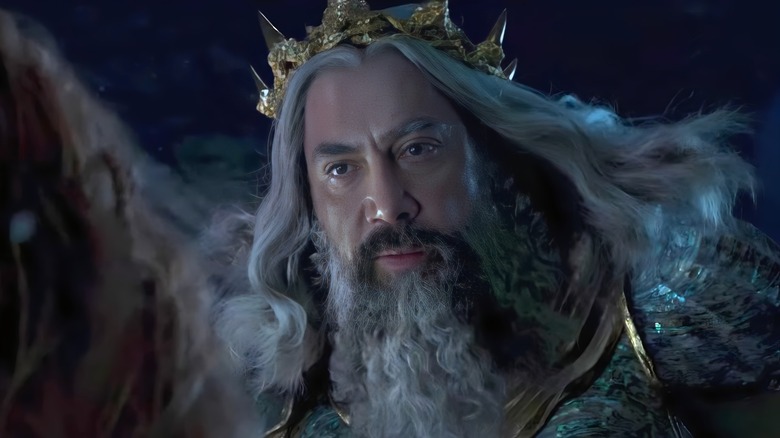Why The Little Mermaid's New Ending Resonated With The Cast
This article contains spoilers for "The Little Mermaid."
The live-action "The Little Mermaid" adaptation has several changes from the Disney animated original including a fresh batch of songs from Lin-Manuel Miranda, the removal of notable scenes such as "Les Poissons," or giving "Poor Unfortunate Souls" a feminist twist by altering the lyrics. But a major part of retooling "The Little Mermaid" for modern audiences was writing a different ending. Ariel and Prince Eric still end up together, of course, but without the pomp and circumstance of a royal wedding between two young teenagers.
In an exclusive interview with /Film, Rob Marshall talked about his decision to remove the memorable celebration from the end of his adaptation: "We don't really have a wedding because we didn't want to make it that it was all the penultimate thing is the wedding. No, it's the relationship." The filmmakers wanted Ariel and Eric to develop a deeper relationship that was based on their similarities and passions, not just love at first sight. They connect over their shared interests in the world around them, excitedly studying world maps, Eric's treasures from his seafaring adventures, and the constellations in the sky. One of the most beautiful aspects of this new "Little Mermaid" is how Ariel and Eric take their time to grow closer to one another and discover that they are very similar people.
Ariel's brave new world
The final shots of the reimagined "Little Mermaid" show Ariel and Eric heading towards a ship to embark on an adventure together. Halle Bailey told /Film that she prefers this ending because it deepens Ariel's journey toward strength and independence. Here's what she said:
"You're seeing Ariel transform in front of your eyes, where at the beginning she's a little bit shy and timid and frustrated because the beautiful things she's voicing about herself and her future and her wants and needs aren't being heard. And so, for her to go out of her way to burst through to the world that she doesn't know, and for her to be brave enough to do so and come out on top the way she did, and fighting for love and friendship and family at the heart of the film is just, it's so cool to see."
This uplifting ending means so much more to Ariel than a traditional wedding because it celebrates what makes her love for Eric so special. Eric found an ideal partner who appreciates his love of exploring the wild, uncharted waters, and Ariel gets to see every corner of the world that she longed to be a part of. They both have an insatiable curiosity about the sea and the sky that surrounds them. The sweet moment where Ariel and Eric sail towards their exciting new voyage teaches audiences that finding a partner who supports your aspirations is the most important part of a romance, not a wedding ceremony.
Learning to let go
During the ending, King Triton still gives Ariel her legs (sadly, with no sparkly dress), but the filmmakers made a lot of other changes to his character. He's no longer a belligerent ruler who flies off the handle; he's a quiet but stern presence. He sincerely apologizes to his daughter for not listening to her or acknowledging her unhappiness. Even though he wants to keep her close, King Triton accepts that she has different dreams for her life than he does. Their reconciliation feels more earned and authentic because he is no longer just the stereotype of a strict, overprotective dad.
Since he is a father of two, Javier Bardem really connected to this well-rounded portrayal of King Triton struggling to accept his daughter's individuality. As he told Deadline:
"As parents, father and mother, we want to protect [our children]. We want to make sure that they are not suffering and that they don't suffer. But life is about joy and pain, all the gray areas and the ups and downs. Those are the things that you cannot avoid. And you have to be there for them, but also let them go and have their own journey. And he realizes that, and it is not easy."
In the updated "Little Mermaid," Ariel and King Triton no longer have an imbalanced, patriarchal power dynamic — they are equals. They both own up to their mistakes and speak openly about their feelings. The foundation of their relationship is honesty and trust rather than blind leadership and harsh punishment.
This is just one of the many positive changes in "The Little Mermaid" that are actually better than the original film.


